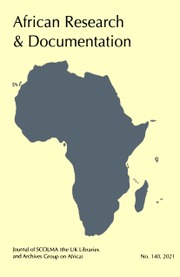No CrossRef data available.
Article contents
Libraries and library automation in Zimbawbe: a brief overview
Published online by Cambridge University Press: 25 April 2022
Extract
Zimbabwe has a rather old-fashioned British air about it to one arriving from England. One of the most common cars is still the Ford Anglia, and Woolworths in Harare has the distinctive shop front and the island counters from behind which assistants serve their customers, so familiar to those who can remember the store in the 1950s. Many street names and the names of suburbs reflect the names of people and places with English connections, so one feels very much at home.
The libraries are under-resourced and have to improvise, but they are not old-fashioned. The National Archives is the national library, having the right of copyright deposit, and the public records office as it keeps the archived records of central government, local authorities and parastatals. It also houses splendid displays of documents illustrating the history of the country and includes statues of important leaders.
- Type
- Articles
- Information
- Copyright
- Copyright © International African Institute 1989
Footnotes
Alan Hopkinson recently visited Zimbabwe at the invitation of the British Council at the suggestion of the British Council Librarian in Harare, John Salter, primarily to offer training in Unesco's CDS/ISIS software package for microcomputers to the Zimbabwe Institute of Development Studies and to conduct a one-day workshop for librarians interested in the package.
He would like to thank the British Council for making the visit possible and the Zimbabwe Institute of Development Studies for their hospitality.




